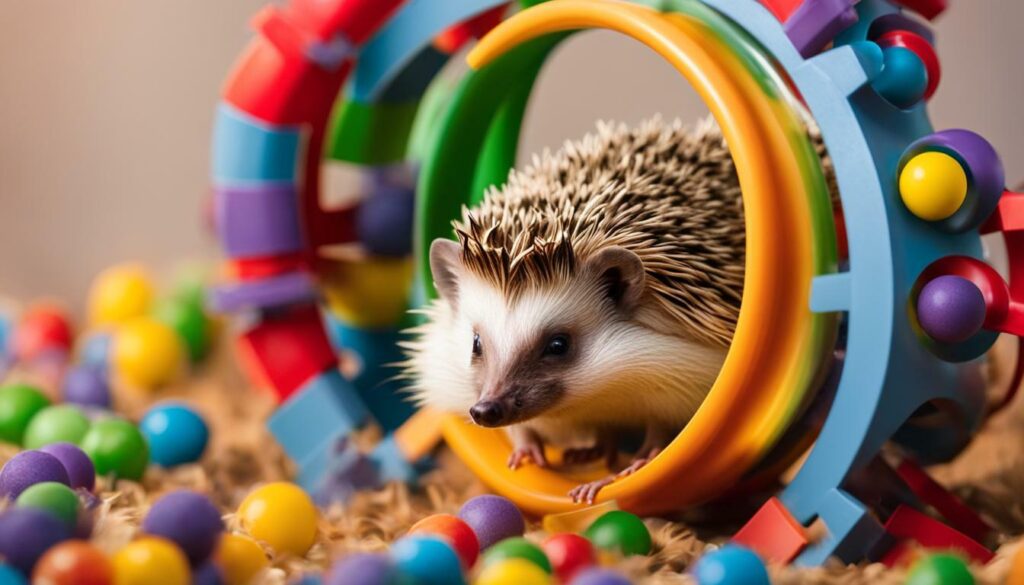Hedgehog Diet and Nutrition
Hedgehogs are insectivores and require a unique diet that consists of specially formulated hedgehog kibble, supplemented with live insects and vegetables. Their dietary needs must be met to ensure their overall health and well-being. Let’s take a closer look at the components of a hedgehog’s diet.
Firstly, hedgehog kibble is the foundation of their nutrition. It is specifically designed to meet their dietary requirements and provide essential nutrients. Look for a high-quality hedgehog kibble that contains a balance of protein, fat, and fiber. This will help support their energy levels, promote healthy growth, and aid in digestion.
Live insects are a vital part of a hedgehog’s diet. They serve as a source of protein and mimic their natural prey in the wild. Crickets, mealworms, and waxworms are some common options. Remember to provide them in moderation and ensure they are gut-loaded, meaning they have been fed a nutritious diet before being offered to your hedgehog.
In addition to kibble and insects, incorporating vegetables into their diet is important. Vegetables such as peas, carrots, and leafy greens can provide essential vitamins and minerals. It’s best to introduce vegetables gradually and observe your hedgehog’s response to each type. Not all hedgehogs will have the same preferences, so it may take some trial and error to find the vegetables they enjoy.
| Nutritional Needs | Sources |
|---|---|
| Protein | Hedgehog kibble, live insects |
| Fat | Hedgehog kibble, live insects |
| Fiber | Hedgehog kibble, vegetables |
| Vitamins and minerals | Vegetables |
It’s important to note that not all foods are safe for hedgehogs. Avoid feeding them fruits, nuts, seeds, dairy products, and sugary treats, as these can be harmful to their health. Always provide fresh water for them to stay hydrated.
By following a balanced diet that includes hedgehog kibble, live insects, and vegetables, you can ensure your hedgehog receives the necessary nutrients for a healthy and happy life.
Disclaimer: Always consult with a veterinarian or a qualified expert for personalized advice regarding your hedgehog’s diet and nutritional needs.
Creating a Safe Habitat for Hedgehogs
Providing a safe and comfortable habitat is crucial for the overall wellness of pet hedgehogs. These unique creatures have specific needs when it comes to their living environment, including their enclosure, bedding, temperature, and safety measures.
First and foremost, hedgehogs need an appropriate enclosure that allows them to move freely while ensuring their safety. Avoid wire-grate cage bottoms as they can injure the hedgehog’s sensitive feet. Instead, opt for a solid surface or a specifically designed hedgehog habitat with suitable flooring. This will help prevent foot injuries and discomfort.
In terms of bedding, hedgehogs require a soft and absorbent material that allows them to burrow and nest. Natural products like paper-based bedding or aspen shavings are recommended options. Avoid using pine or cedar bedding, as the aromatic oils can be harmful to hedgehogs’ respiratory systems.
| Enclosure | Bedding | Temperature | Safety |
|---|---|---|---|
| Appropriate size and design | Soft and absorbent material | Consistent and controlled | Avoid hazards and dangers |
| Allows free movement | Paper-based or aspen shavings | Between 72°F and 80°F | No wire-grate cage bottoms |
| Includes hiding spots and toys | Avoid pine or cedar bedding | Avoid extreme temperature fluctuations | Remove harmful materials |
Temperature control is also essential for hedgehogs’ well-being. The optimal temperature range for hedgehogs is between 72°F and 80°F. Avoid exposing them to extreme heat or cold, as it can be detrimental to their health. Maintaining a consistent and controlled temperature in their enclosure is vital.
Lastly, ensuring a safe environment for hedgehogs involves removing any potential hazards or dangers. Keep their enclosure away from drafts, direct sunlight, and noisy areas to minimize stress. Regularly inspect the enclosure for any loose wires, sharp edges, or toxic substances that could harm your pet. Providing hiding spots and appropriate toys will also contribute to their mental and physical well-being.
Exercise and Enrichment for Hedgehogs
Hedgehogs require regular exercise and enrichment to prevent depression, obesity, and foot sores. Providing them with a large enclosed running wheel is essential for their physical activity. A running wheel allows hedgehogs to engage in their natural behavior of running and exploring. It is important to choose a wheel with a solid surface to prevent their feet from getting caught, which can lead to foot sores. Placing the wheel in a safe location within their enclosure will encourage their exercise and keep them entertained.
In addition to a running wheel, hedgehogs also benefit from having activity toys in their habitat. Toys that stimulate their natural instincts, such as tunnels, puzzle feeders, and treat balls, can provide mental stimulation and prevent boredom. These toys encourage hedgehogs to explore, play, and forage for their food, keeping them mentally and physically active.
When selecting toys for hedgehogs, it is important to choose ones that are safe and suitable for their size. Avoid small or easily breakable toys that could pose a choking hazard. Opt for toys made from hedgehog-safe materials, such as non-toxic plastic or wood. Introducing new toys periodically can prevent boredom and keep them engaged in their environment.
Enrichment Quote:
“Regular exercise and enrichment are vital for the well-being of hedgehogs. Providing them with a stimulating environment helps prevent health issues and ensures their overall happiness.” – Dr. Jane Anderson, Hedgehog Care Specialist.
Enrichment Tips:
- Offer a variety of toys and activities that cater to different hedgehog instincts.
- Rotate toys regularly to keep hedgehogs engaged and interested.
- Hide treats throughout their enclosure to encourage exploration and foraging.

Remember, regular exercise and enrichment are essential for the physical and mental well-being of your hedgehog. By providing them with a suitable running wheel and a range of engaging toys, you can ensure that they stay active, happy, and healthy.
Handling and Taming Hedgehogs
Hedgehogs can be held and tamed with patience and care, considering their temperament and specific preferences. While they may initially roll into spiked balls when scared, with time and trust-building, they can become accustomed to human interaction. It is important to handle hedgehogs gently and avoid sudden movements or loud noises that might startle them. Slowly introducing your scent through frequent and gentle handling sessions can help them become more comfortable with you.
“It’s important to remember that hedgehogs are naturally solitary animals and may require more time and patience to adjust to human interaction compared to other pets. Building a bond with your hedgehog can be a rewarding experience, but it requires dedication and understanding of their unique needs.”
Water aversion is another characteristic of hedgehogs that owners should be aware of. Most hedgehogs dislike being submerged in water and can become stressed or agitated if forced to take a bath. Instead, it is recommended to provide them with a shallow bowl of water for occasional foot baths. This allows them to clean their feet without causing distress.
It’s important to note that not all hedgehogs will have the same temperament or level of comfort with handling. Some may be more naturally social and receptive to interaction, while others may be more reserved or shy. Understanding and respecting your hedgehog’s individual personality is key to building a positive relationship and ensuring their well-being.
Avoiding Spiked Balls
Handling hedgehogs requires a cautious approach to prevent them from rolling into spiked balls. In order to avoid this defensive behavior, it is recommended to approach them from the front or side, while speaking softly to reassure them. Supporting their body with both hands and allowing them to uncurl naturally can help minimize stress and prevent accidental pricks.

| Handling Tips | Taming Strategies |
|---|---|
| 1. Approach from the front or side | 1. Establish trust through frequent, gentle handling |
| 2. Speak softly to reassure them | 2. Provide a safe and comfortable environment |
| 3. Support their body with both hands | 3. Offer treats and rewards for positive behaviors |
| 4. Allow them to uncurl naturally | 4. Be patient and understanding of their individual temperament |
Common Health Concerns for Hedgehogs
Hedgehogs are prone to several health issues, including dental problems, skin conditions, intestinal parasites, tumors, and obesity. It is essential for hedgehog owners to be aware of these common health concerns and take appropriate measures to ensure the well-being of their pets.
Dental disease is a significant concern for hedgehogs. Their teeth continue to grow throughout their lives, and without proper dental care, they can develop overgrown teeth, abscesses, and other dental issues. Regular veterinary check-ups and providing suitable chew toys can help prevent dental disease. It is important to note that hedgehogs may need occasional dental trimming if their teeth become excessively long.
Skin issues are also common in hedgehogs. They are prone to dry skin, mites, fungal infections, and quill loss. Maintaining a clean and hygienic environment, providing appropriate bedding, and ensuring proper temperature and humidity levels in their enclosure can help prevent skin problems. Regular grooming, including gentle brushing, can also aid in maintaining healthy skin and a glossy coat.
Another concern for hedgehogs is the presence of intestinal parasites. These parasites can cause digestive disturbances, weight loss, and overall poor health. Regular fecal examinations and appropriate deworming treatments prescribed by a veterinarian are necessary to control and prevent intestinal parasites. It is important to note that over-the-counter dewormers should be avoided as they may not be effective or safe for hedgehogs.
Tumors are a potential health issue in hedgehogs, particularly in older individuals. Tumors may develop in various organs, including mammary glands, skin, and internal organs. It is crucial to monitor hedgehogs for any abnormal growths or changes in behavior and seek veterinary attention promptly for further evaluation and treatment.
Lastly, obesity is a concern that should not be overlooked. Hedgehogs have a tendency to overeat and can easily become overweight if their diet and exercise are not properly regulated. Providing a balanced diet, monitoring portion sizes, and ensuring regular exercise can help prevent obesity and maintain a healthy weight for hedgehogs.
| Health Concerns | Prevention and Treatment |
|---|---|
| Dental problems | Regular veterinary check-ups, suitable chew toys, occasional dental trimming if needed |
| Skin conditions | Clean and hygienic environment, appropriate bedding, proper temperature and humidity levels, regular grooming |
| Intestinal parasites | Regular fecal examinations, veterinarian-prescribed deworming treatments |
| Tumors | Monitoring for abnormal growths, seeking veterinary attention for evaluation and treatment |
| Obesity | Balanced diet, portion control, regular exercise |
Regular veterinary check-ups, proper dental care, and a well-balanced diet play a crucial role in maintaining hedgehog health. By addressing these common health concerns and taking preventive measures, hedgehog owners can ensure their pets live happy and healthy lives.

Providing hedgehogs with a suitable enclosure, temperature-controlled environment, proper grooming, and understanding their nocturnal nature is essential for their well-being. These unique pets require specific care to ensure their health and happiness.
A suitable enclosure for a hedgehog should have ample space for them to move around and explore. Avoid wire-grate cage bottoms as they can injure their feet. Instead, opt for solid flooring or a cage with a solid pan. Additionally, a hide box should be provided to give them a secure and comfortable place to rest.
To maintain a temperature-controlled environment, it is recommended to keep the enclosure between 72-80°F (22-27°C). Use a thermometer to monitor the temperature and provide a heat source, such as a heat lamp or a heating pad, to ensure they stay warm. Avoid placing the enclosure in direct sunlight or in drafty areas.
Grooming is an important aspect of hedgehog care. While hedgehogs are generally clean animals, they may require occasional bathing if they get dirty. Use a shallow basin filled with warm water and a mild, fragrance-free shampoo designed specifically for small animals. Be cautious and make sure the water is not too deep to avoid any accidents. Hedgehogs have an aversion to water, so keep the bathing experience as short and stress-free as possible. After bathing, make sure to dry them thoroughly to prevent chilling.

In addition to proper enclosure setup, temperature control, and grooming, it is important to remember that hedgehogs are nocturnal animals and prefer to be active at night. Providing them with a quiet and dark environment during the day is essential for their natural sleep patterns and overall well-being. Consider placing their enclosure in a quiet area away from direct sunlight and household noise.
By following these care guidelines, you can ensure that your hedgehog stays healthy and happy. Regular veterinary check-ups, a nutritious diet, and awareness of potential health concerns are also crucial for their overall well-being. With the right care and attention, your pet hedgehog can thrive in their environment, bringing joy to both them and you.
Veterinary Care for Hedgehogs
Regular veterinary care, including check-ups and dental care, is crucial for maintaining the health and well-being of hedgehogs. These unique pets require specialized attention to ensure they stay happy and healthy. Hedgehogs can be prone to dental disease, skin issues, intestinal parasites, tumors, and obesity, which is why it is important to schedule regular visits to a qualified veterinarian who has experience in treating hedgehogs.
During check-ups, the veterinarian will assess the overall health of the hedgehog, check for any signs of illness or injury, and provide advice on proper care and nutrition. Dental care is particularly important for hedgehogs, as they can suffer from dental disease due to their constant gnawing and chewing habits. Regular dental check-ups, cleanings, and possible tooth trims may be necessary to prevent complications and ensure a healthy mouth.
Giving your hedgehog proper veterinary care also includes monitoring their weight and body condition, as obesity can be a common issue. The veterinarian can provide guidance on a suitable diet and exercise routine to help maintain a healthy weight. In addition, they will be able to offer advice on creating a suitable habitat, including proper bedding and temperature control, to ensure your hedgehog’s comfort and well-being.

- Look for a veterinarian who has experience with exotic pets, specifically hedgehogs.
- Ask for recommendations from other hedgehog owners or local exotic pet communities.
- Ensure that the veterinarian has access to the necessary equipment and facilities to handle hedgehogs.
- Inquire about their knowledge of hedgehog-specific health concerns and treatment options.
- Consider the veterinarian’s communication style and how comfortable you feel discussing your hedgehog’s care with them.
By prioritizing regular veterinary care and providing the necessary dental care, you can help ensure that your hedgehog remains healthy and happy for years to come.
Pet Hedgehog’s Social Needs
Hedgehogs have social needs and require an environment that allows them to interact and engage with their owners. While they may not be as sociable as some other pets, hedgehogs still benefit from regular human interaction and enrichment activities. Providing a suitable social environment is essential for their overall well-being.
One way to encourage social interaction is by spending time with your hedgehog outside of their enclosure. Allow them to explore a safe and secure area while supervised. This will not only provide exercise but also help them become familiar with their surroundings and build trust with their owner. Remember to create a hedgehog-proof space, free of hazards and potential escape routes.
In addition to physical interaction, mental stimulation is important for hedgehogs. Offer a variety of toys and activities that allow them to explore and engage their natural instincts. Hedgehogs are known for their curious nature, so puzzle toys, treat-dispensing toys, and tunnels can provide hours of entertainment.
“Hedgehogs have social needs and require an environment that allows them to interact and engage with their owners.”
It’s important to note that hedgehogs are nocturnal animals, which means they are most active during the night. As a pet owner, you’ll need to adjust your schedule to accommodate their natural rhythm. Take time to interact with your hedgehog during their active hours, which typically begin in the evening. Engaging with them during these times will ensure they receive the social interaction they need.
| Activities to encourage socialization: | Tips for providing a social environment: |
|---|---|
|
|
By understanding and meeting the social needs of your hedgehog, you can ensure they live a happy and fulfilling life as your pet. Remember, each hedgehog may have different preferences and personalities, so it’s essential to observe and adjust your interactions accordingly. With proper socialization and a stimulating environment, your hedgehog will thrive.

Here are some frequently asked questions about hedgehog care, along with helpful answers and advice.
What should I feed my pet hedgehog?
Hedgehogs are insectivores, so their diet should consist of specially formulated hedgehog kibble that provides them with the necessary nutrients. It is important to supplement their diet with live insects, such as mealworms or crickets, and small portions of vegetables. Avoid feeding them fruits, dairy products, or sugary treats as these can cause health issues.
How should I set up a suitable enclosure for my hedgehog?
When creating a habitat for your hedgehog, choose a spacious enclosure with solid walls to prevent them from escaping. Avoid wire-grate cage bottoms as they can injure their feet. Provide suitable bedding such as paper-based bedding or fleece liners for their comfort. Maintain a temperature-controlled environment between 72°F and 80°F (22°C and 27°C) to keep them warm and healthy.
What exercise and enrichment do hedgehogs need?
Hedgehogs are active creatures and require regular exercise to prevent health issues like obesity and foot sores. A large enclosed running wheel is essential for their well-being. Additionally, provide them with activity toys and tunnels to keep them mentally stimulated. Ensure their environment is safe and free of hazards that could cause injuries.
How do I handle and tame my hedgehog?
When handling a hedgehog, it’s important to be gentle and approach them calmly to avoid scaring them. They may roll into spiked balls as a defensive mechanism, but with time and patience, they can be tamed. It’s best to start handling them when they are young. Avoid forcing them into water as hedgehogs have an aversion to it. Instead, provide them with a shallow dish for foot baths to promote cleanliness.
What are common health concerns for hedgehogs?
Hedgehogs can experience dental disease, skin issues, intestinal parasites, tumors, and obesity. Regular veterinary check-ups are important to monitor their overall health and address any potential issues. Proper dental care, such as regular brushing or providing appropriate chew toys, can help prevent dental problems. Ensure your hedgehog has a balanced diet and maintain a clean living environment to minimize the risk of health issues.
Any other tips for hedgehog care?
Alongside a suitable enclosure and a nutritious diet, it’s important to provide your hedgehog with proper grooming, such as trimming their nails and cleaning their ears. Hedgehogs are nocturnal animals, so they prefer to be active during the night. Make sure to schedule regular veterinary care to ensure their well-being. Always handle your hedgehog with care and respect their unique temperament.
FAQ
Q: What should I feed my hedgehog?
A: Hedgehogs should be fed a specially formulated hedgehog kibble supplemented with live insects and vegetables.
Q: What kind of habitat should I provide for my hedgehog?
A: Hedgehogs require a suitable enclosure with safe bedding and temperature-controlled environment.
Q: How do I ensure my hedgehog gets enough exercise?
A: Providing a large enclosed running wheel and activity toys will help meet your hedgehog’s exercise needs.
Q: Can hedgehogs be held and tamed?
A: Yes, hedgehogs can be held and tamed, but they may roll into spiked balls when scared.
Q: What are common health concerns for hedgehogs?
A: Common health concerns for hedgehogs include dental disease, skin issues, intestinal parasites, tumors, and obesity.
Q: How should I groom my pet hedgehog?
A: Proper grooming for hedgehogs includes regular cleaning of their enclosure and providing them with a suitable temperature-controlled environment.
Q: How often should I take my hedgehog to the vet?
A: Regular veterinary check-ups are recommended for hedgehogs to ensure their overall health and well-being.
Q: Do hedgehogs have social needs?
A: Hedgehogs may have social needs, and it’s important to provide them with a suitable environment for interaction and engagement.
Q: What are some frequently asked questions about hedgehog care?
A: Here are some frequently asked questions about hedgehog care:
Q: How often should I clean my hedgehog’s cage?
A: It is recommended to clean your hedgehog’s cage at least once a week.
Q: What temperature should a hedgehog’s habitat be?
A: The ideal temperature for a hedgehog’s habitat is between 72-80 degrees Fahrenheit.
Q: Can I bathe my hedgehog?
A: While hedgehogs can be bathed, they are not big fans of water and may require patience and caution during the bathing process.






